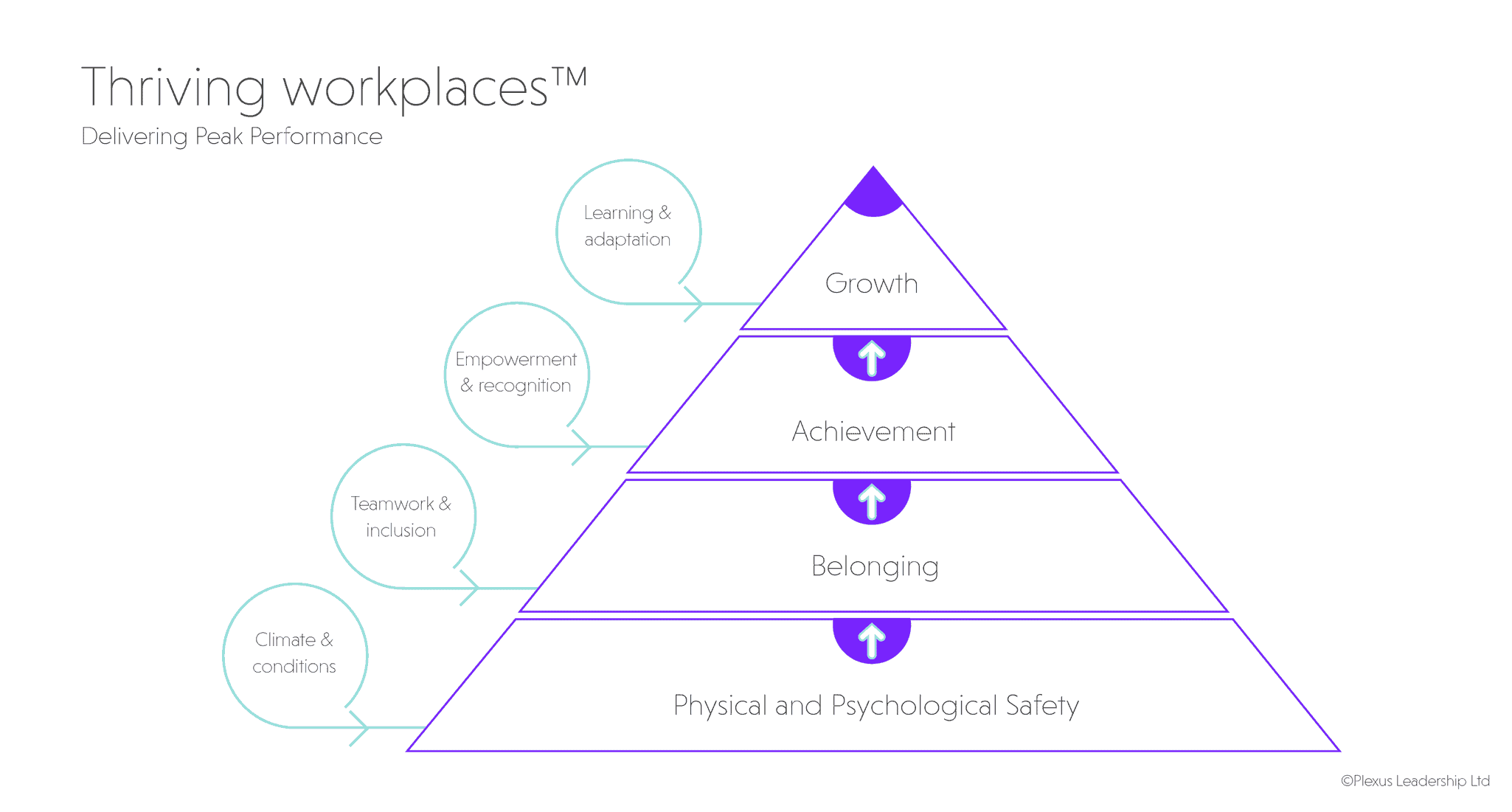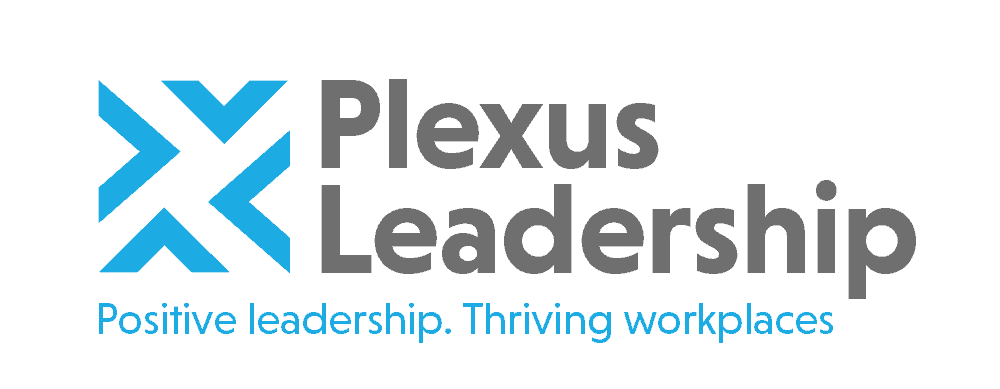Positive leaders understand the importance of creating conditions where individuals and teams can do their best work and achieve their full potential. They see people not as resources or assets, but as key value-multipliers of the business.
They understand the importance of meeting 4 key needs of employees so that they can thrive at work. Starting at the base of the pyramid below, let’s look at each in turn:

Level 1: Physical and Psychological Safety
People require conditions where they feel safe, not just physically, but also psychologically. This means that they should feel the company cares about them and will minimise the risks of any harm to them, including emotional and mental suffering. The concept of psychological safety is becoming more popular now than when it was first coined in the 90’s due to increased work pressures and the dizzying pace of change.
Having a workplace that is psychologically safe means that people feel able to show up at work every day without being embarrassed, marginalised, bullied or unfairly disciplined. However, it also means that people are free to express their thoughts and emotions at work without worrying that they will be harshly judged or face other adverse consequences. People want to feel that they can count on their leader to look out for them and provide support, especially when tough problems arise that overwhelm them and lead to significant distress.
Steps leaders can take:
- Introduce a wellbeing strategy to ensure health and safety addresses mental and psychological, as well as physical safety.
- Ensure the company has clear policies to tackle bullying, victimisation, harassment, overuse of authority and other inappropriate conduct.
- Set up a safe helpline for people to use to report any unacceptable behaviour to an independent professional such as HR or a H&S specialist.
- Ensure you show empathy and compassion when people are experiencing mental distress or anxiety. Listen carefully and do not pass judgement or dish out lots of advice. Rather, ensure they know you have heard them and understand how they are feeling. Let them know they can count on your support and invite them to speak to HR, a counselling service or the company’s Employee Assistance Program helpline (if you have an EAP in place).
Level 2: Belonging
Everyone has a deep desire for belonging, at work and outside. They want to feel they are a valued part of their community or ‘tribe’, regardless of their background or differences. Belonging goes beyond acceptance and inclusion of diverse people, personalities, and perspectives. It involves giving people a voice in how their work is accomplished and in shaping the future of the team and organization.
Steps leaders can take:
- Build a team culture where people feel differences are appreciated, actively encouraged and respected.
- Learn to be more conscious about your biases. Tackle these head on by confronting erroneous and limiting assumptions and beliefs and getting to know people from backgrounds you are less familiar or comfortable with.
- Ensure everyone in your team has a voice during meetings, especially those who are more reserved or lacking confidence. One way of doing this is to bookend the start of regular team meetings with a 45-60 second update from everyone on their achievements the previous week. Similarly, we suggest you bookend the close of the meeting with a 45-60 second close-out on the most important action or reflection they are taking from the meeting.
- Ensure you build time for social activities where people can get to know one another better and deepen their connections. Ensure team socials and team building activities do not exclude people or make them feel inadequate based on their physical strength, age, religion, diet or other differences.
Level 3: Achievement
Most people have a deep drive for achievement and success. They want to do well and achieve their goals and personal development aspirations. They want to feel they are empowered to act and supported to be at their best.
Steps leaders can take:
- Find out what people’s aspirations and dreams are. Try to align these with the organization’s tasks and goals.
- Set ambitious goals for people and show you believe in them. Positive belief goes a long way to motivate people, as was well illustrated in the famous classics, “Pygmalion” and “My Fair Lady”, a storyline that has been repeated in numerous modern movies for good reason. Research has consistently shown that when leaders regularly express their positive belief in team members’ talents and potential, performance is significantly improved.
- Provide regular encouragement and praise when you spot people doing good work. Apply the principle of “marginal gains” used in Olympic coaching by recognising not only big achievements, but also smaller improvements in effort and results. Remember that small shifts in performance often lead to big leaps in performance over time.
- Provide regular and constructive performance feedback. This involves being honest, specific and helping the person understand what “great” looks like. Our AIM Feedback Process™ will help you improve the effectiveness of your feedback.
Level 4: Growth
People have an innate desire to learn and realise their full potential. They want to grow both personally and professionally.
Steps leaders can take:
- Provide coaching and development opportunities in line with people’s aspirations, strengths and improvement areas.
- Set up cross-team peer coaching and development groups to enable people to learn from one another and build connections beyond their immediate team or business area.
- Encourage people to adapt themselves and lean into the future by learning vital new skills like influencing, AI, empathy and curiosity, to ensure they are fit for tomorrow’s as well as today’s challenges.
- Cultivate a learning culture – one where everyone is expected to be open-minded and curious, own their learning, share ideas and insights and experiment with new and improved ways of working. Investing in your own learning and development is crucial as people won’t be as motivated to spend time developing themselves unless they see their leader and peers taking learning seriously.
Provided the company has a well-defined purpose and strategy, peak performance comes about when leaders hire talented people and provide them with the right conditions where they can do their best work while at the same time fulfilling their key needs. Positive leaders understand the importance of creating a climate where people can thrive at work by taking practical steps to improve their sense of safety, belonging, achievement and growth.
Other Posts

About the Author
James Brook
Founder and MD | Leadership Consultant | Organizational Psychologist
James is a leadership consultant, organizational psychologist and executive coach. He has over 25 years’ experience working with leaders, teams and organizations globally to optimize their performance, talent and future success. He specializes in positive leadership, thriving workplaces, collaboration and influencing, organizational change and transformation, accelerating innovation and coaching executives and leaders in innovative sectors including Tech, Digital, E-commerce and Life Sciences.
Before setting up Plexus Leadership, James held leadership roles in HR and Talent Management in the UK and abroad with companies such as NatWest, Yahoo! and Novo Nordisk Pharmaceuticals. After this, he founded and led several talent and leadership consulting and assessment businesses, including Strengthscope®, an online strengths assessment and development business serving a wide range of UK and global clients. James grew this venture into a global market leader before selling the business in 2018.
James has supported, advised and coached leaders and teams globally across diverse industries and geographies. Clients he has worked with include Allen & Overy, Commvault, Equinor, Facebook, GSK, Hilton, John Lewis, Novartis Pharmaceuticals, NHS, Oracle, Sainsbury’s, Swiss Re, Tesco, Takeda Pharmaceuticals, WSP and Yahoo!.
James has a Master’s in Organizational Psychology, an MBA, an Advanced Diploma in Executive Coaching and a Harvard Business qualification in Sustainable Business Strategy. He is a member of the Institute of Directors, the Association of Business Psychologists and a Fellow of the Chartered Institute of Personnel and Development (FCIPD). He is currently undertaking a PhD in Organizational Psychology examining the start-up experiences of Tech and Digital entrepreneurs.
James is a regular contributor and speaker on leadership, coaching, innovative talent management and the future of work. His most recent book, Optimize Your Strengths, explores how leaders can create thriving workplaces by inspiring and supporting people to optimize their potential and teamwork to deliver breakthrough results.





